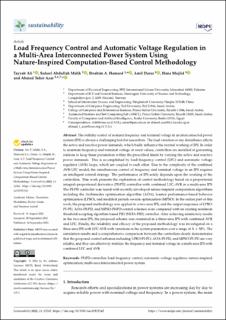Load Frequency Control and Automatic Voltage Regulation in a Multi-Area Interconnected Power System Using Nature-Inspired Computation-Based Control Methodology
Ali, Tayyab; Malik, Suheel Abdullah; Hameed, Ibrahim A.; Daraz, Amil; Mujlid, Hana; Azar, Ahmad Taher
Peer reviewed, Journal article
Published version
Permanent lenke
https://hdl.handle.net/11250/3055664Utgivelsesdato
2022Metadata
Vis full innførselSamlinger
- Institutt for IKT og realfag [555]
- Publikasjoner fra CRIStin - NTNU [37225]
Sammendrag
The stability control of nominal frequency and terminal voltage in an interconnected power system (IPS) is always a challenging task for researchers. The load variation or any disturbance affects the active and reactive power demands, which badly influence the normal working of IPS. In order to maintain frequency and terminal voltage at rated values, controllers are installed at generating stations to keep these parameters within the prescribed limits by varying the active and reactive power demands. This is accomplished by load frequency control (LFC) and automatic voltage regulator (AVR) loops, which are coupled to each other. Due to the complexity of the combined AVR-LFC model, the simultaneous control of frequency and terminal voltage in an IPS requires an intelligent control strategy. The performance of IPS solely depends upon the working of the controllers. This work presents the exploration of control methodology based on a proportional integral–proportional derivative (PI-PD) controller with combined LFC-AVR in a multi-area IPS. The PI-PD controller was tuned with recently developed nature-inspired computation algorithms including the Archimedes optimization algorithm (AOA), learner performance-based behavior optimization (LPBO), and modified particle swarm optimization (MPSO). In the earlier part of this work, the proposed methodology was applied to a two-area IPS, and the output responses of LPBO-PI-PD, AOA-PI-PD, and MPSO-PI-PD control schemes were compared with an existing nonlinear threshold-accepting algorithm-based PID (NLTA-PID) controller. After achieving satisfactory results in the two-area IPS, the proposed scheme was examined in a three-area IPS with combined AVR and LFC. Finally, the reliability and efficacy of the proposed methodology was investigated on a three-area IPS with LFC-AVR with variations in the system parameters over a range of  ± 50%. The simulation results and a comprehensive comparison between the controllers clearly demonstrates that the proposed control schemes including LPBO-PI-PD, AOA-PI-PD, and MPSO-PI-PD are very reliable, and they can effectively stabilize the frequency and terminal voltage in a multi-area IPS with combined LFC and AVR.

